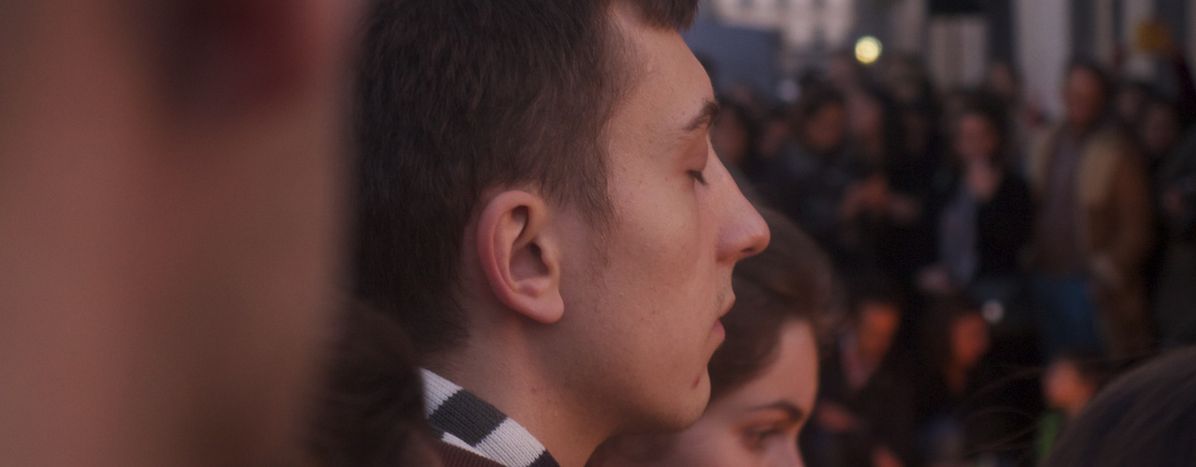
Chaos in Paris: The attacks as seen from Berlin
Published on
Translation by:
Melisa Laura DíazLast Friday, France experienced one of the deadliest attacks in its history. This is my account of the 13th of November, 2015, watching the chaos broadcast live on a big screen in Berlin.
It's Friday evening. 20:45. The friendly match between France and Germany begins and I watch it with friends and colleagues in a small bar in the Neukölln district of Berlin. We just visited a WWII bunker, an excursion organized by colleagues. This reminded me of the horrors of that war, of the French and British aviation bombarding Berlin just 70 years ago. Of this unparalleled violence, of the brainwashing of the Nazi ideology. Of a Europe that ended up a bloodbath, reduced to rubble.
It's the beginning of the match. One of our friends only arrived back from spending a few days in Paris two weeks ago. While watching the preparations for the match on the big screen, he tells me about the artists who played at Pitchfork festival, of a nice small bar he found near the Canal St. Martin, very close to his Parisian friend's new flat.
Then the players sing the Marseillaise. My friends make fun of me because I don't remember the exact words. I explain myself, I don't really like sanguinary anthems or words of war. Despite this, I am rather glad to see the first French goal, right before the end of the first half. After all, the Mannschaft is already a World Champion. It is a friendly match. A match that represents the Franco-German friendship. The friendship of our people, in spite of the bloody history linking us.
It's an evening spent among friends. A joyful evening. During the first half, we watch Hollande and Steinmeier, the Foreign Minister, sitting in the stands, talking to one another. “Maybe they are talking about FIFA's corruption scandal, or of the Benzéma business,” says a friend. By the time they show a second close up, Hollande isn't sitting beside Steinmeier any more. I say laughing: “Hollande had to sneak out to go to find his Julie.” How naive.
When looking by chance at my phone's screen, lighting up on the table beside my glass of rosé, I see a notification. Shootings in Paris, we are still counting the number of people killed, announces Der Spiegel. I pass my phone to my friend. He is appalled by what he reads, but answers with a reassuring tone: “Let's wait to see whether other papers say about it. Sometimes journalists go a little too far.”
I concentrate on the match. But a few minutes later, a new notification, this time from the English newspaper The Guardian. The same information. I tell the rest of the group. They look at each other incredulously. Someone says: “It must just be some nutcase who went off the rails.” At this time, we were nowhere near imagining the true extent of the massacre, the bloodbath revealing itself on the screen in front of our eyes, live from the Stade de France.
The end of the match approaches. Slowly but surely, we start to become aware of the scope of the catastrophe. The images of the Stade de France being evacuated, transmitted to the bar's big screen, will remain engraved in my memory for the rest of my life. The panic on the face of the supporters. The crowd meeting on the lawn, running, not knowing which way to go. Terrified glances. The comments of the TV correspondent from the German public TV station ARD in Paris, trying her best to keep calm and do her job.
Then we heard about the hostage situation at Bataclan. We can hardly understand what is happening, but the number of dead keeps growing. We follow the information updates, but we cannot digest what we see - it seems too surreal to be true. Too shocking, our brains refuse to believe it.
Like many victims of these attacks, I am sitting in a bar, free as a bird, in the company of friends, laughing, and enjoying the beginning of the weekend. Suddenly, out of the blue, this Friday had turned into absolute horror. I am the only Frenchwoman in the bar, but I feel the general sense of fear that spreads in a matter of seconds. I see the people around me shivering, trembling and crying for their neighbours. Their faces distorted by fear, sadness, and incomprehension. Even though we are in Berlin, safe and sound.
I write to my best friend in Paris, who is working for TF1 this evening - she is a journalist. She confirms she's fine. I write to another friend, who wanted to go to the 11th arrondissement this evening. Finally, close to tears, I leave the bar and call my mother. She was peacefully sleeping. I burst into tears in front of the bar. The words just won't come out of my mouth. After all, once said aloud, the terror becomes real. I repeat to myself: “This is horrible, this is horrible, I don't understand…” Even two days later, I still couldn't believe it.
After hugging all my friends tightly, I leave the bar to Skype with a friend in Paris and follow the events on BFM. From the safety of my bed, I speak to my friend and keep myself informed thanks to the continuous media coverage. I try to smile. I am irritated; I feel impotent in the face of this carnage. We looked at each other silently. After Hollande's speech we hang up. I try to sleep.
The following day, the images of the events of the day before return to me. The nightmare is reality.
---
This article was published by our local team at cafébabel Berlin.
Translated from Carnage. Les attentats vus de Berlin.



